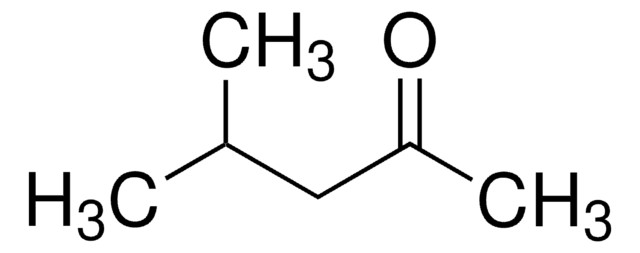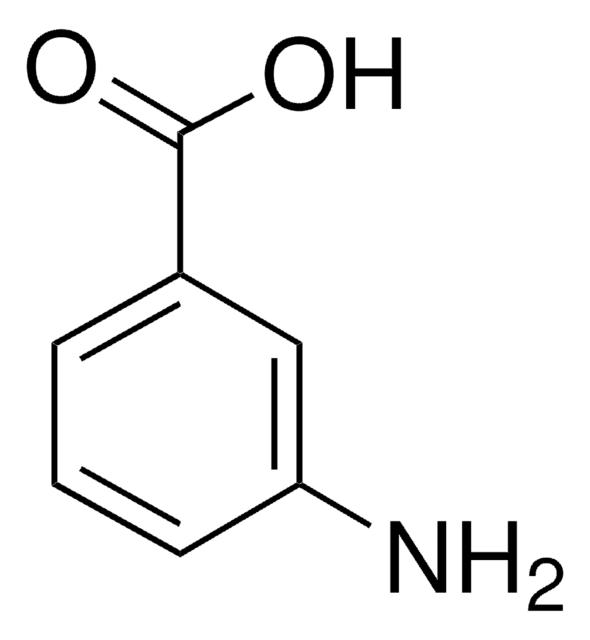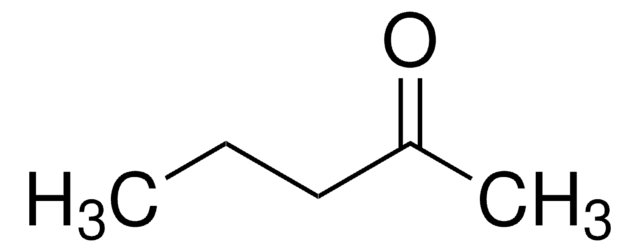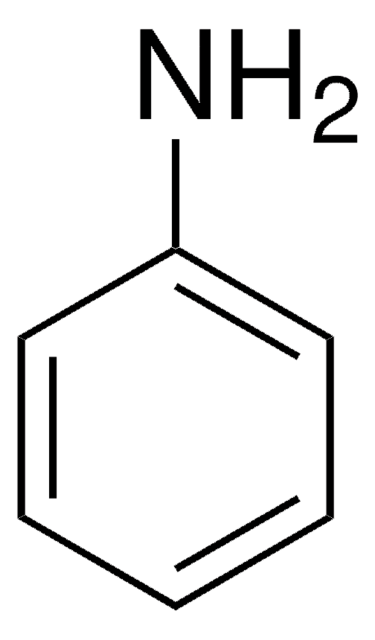02474
4-Methyl-2-pentanone
analytical standard
Synonym(s):
Isobutyl methyl ketone, Isopropylacetone, MIBK, Methyl isobutyl ketone
About This Item
Recommended Products
grade
analytical standard
Quality Level
vapor density
3.5 (vs air)
Assay
≥99.7% (GC)
autoignition temp.
840 °F
shelf life
limited shelf life, expiry date on the label
expl. lim.
1.2-8 %, 93 °F
technique(s)
HPLC: suitable
gas chromatography (GC): suitable
refractive index
n20/D 1.395 (lit.)
n20/D 1.396
bp
117-118 °C
mp
−80 °C (lit.)
density
0.801 g/mL at 25 °C (lit.)
application(s)
cleaning products
cosmetics
environmental
flavors and fragrances
food and beverages
personal care
format
neat
SMILES string
CC(C)CC(C)=O
InChI
1S/C6H12O/c1-5(2)4-6(3)7/h5H,4H2,1-3H3
InChI key
NTIZESTWPVYFNL-UHFFFAOYSA-N
Looking for similar products? Visit Product Comparison Guide
General description
Application
Recommended products
recommended
Signal Word
Danger
Hazard Statements
Precautionary Statements
Hazard Classifications
Acute Tox. 4 Inhalation - Carc. 2 Inhalation - Eye Irrit. 2 - Flam. Liq. 2 - STOT SE 3
Target Organs
Central nervous system
Supplementary Hazards
Storage Class Code
3 - Flammable liquids
WGK
WGK 1
Flash Point(F)
57.2 °F - closed cup
Flash Point(C)
14 °C - closed cup
Personal Protective Equipment
Choose from one of the most recent versions:
Already Own This Product?
Find documentation for the products that you have recently purchased in the Document Library.
Customers Also Viewed
Articles
The Utility of Headspace Grade Solvents for the Analysis of Organic Volatile Impurities
Butyl methyl ether; Acetic acid; 2-Butanone; Ethyl acetate; Tetrahydrofuran; 1-Butanol; Isopropyl acetate; Heptane; Propyl acetate; 3-Methylbutanol; 4-Methyl-2-pentanone; Isobutyl acetate; Butyl acetate; Dimethyl sulfoxide; Anisole; Cumene
Protocols
Separation of 4-Methyl-2-pentanone; Dimethyl disulfide; Hexanal; 3-Methylpentane; Acetone
Protocol for GC Analysis of Class 3 Residual Solvents on SUPELCOWAX® 10
US EPA Method 8260 describes the analysis of volatile organic compounds in solid wastes and ground waters. This application illustrates the analysis of many compounds commonly analyzed by this method using purge and trap coupled to GC-MS.
Our team of scientists has experience in all areas of research including Life Science, Material Science, Chemical Synthesis, Chromatography, Analytical and many others.
Contact Technical Service









